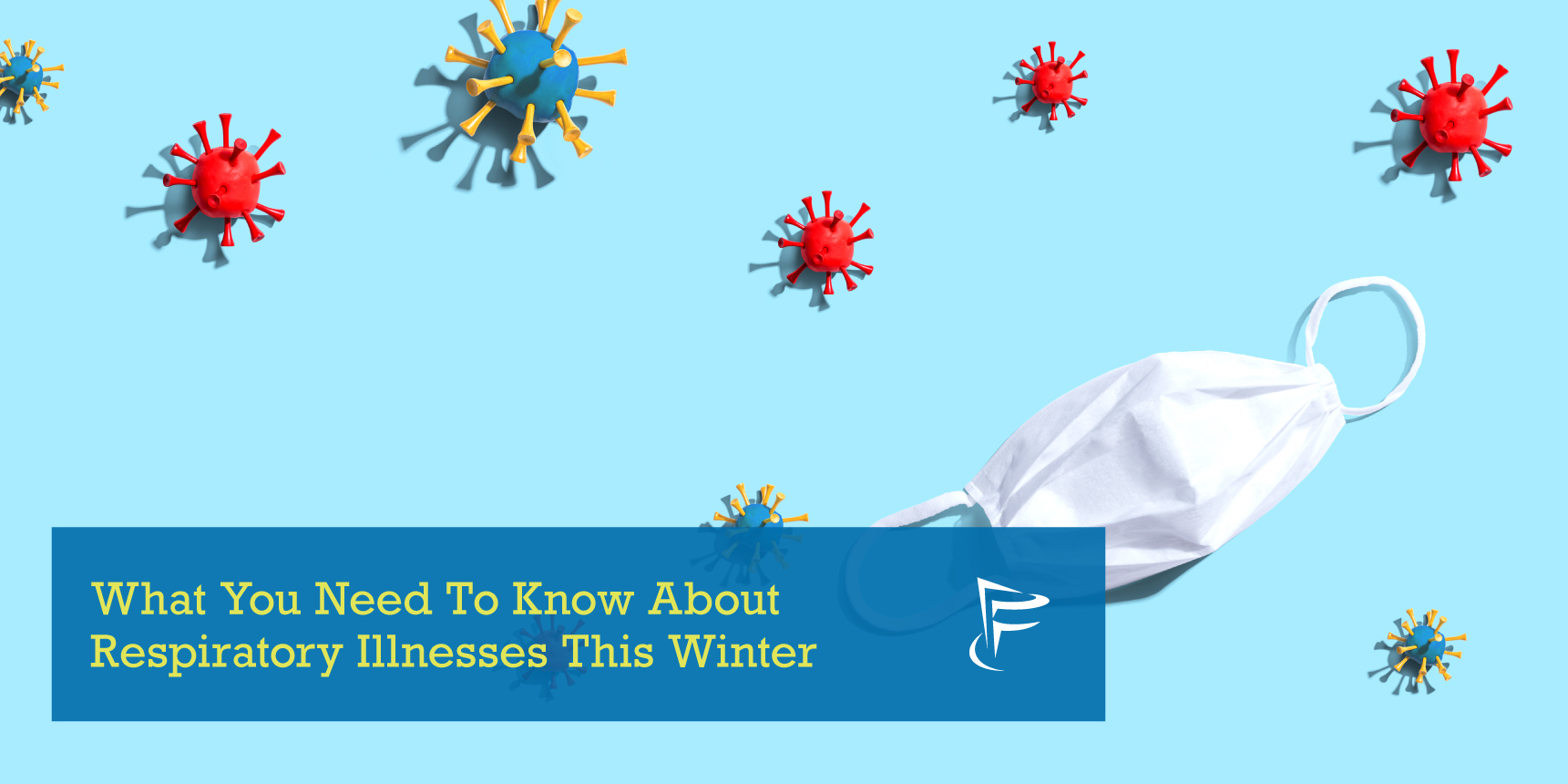What You Need To Know About Respiratory Illnesses This Winter
- Category: Health News
- Posted On:
Respiratory illnesses are more common in colder months for a number of reasons. First, the cold makes respiratory droplets (which help spread respiratory viruses) stay in the air for longer. Second, people spend more time inside and closer to other people, which helps spread sickness. This winter, we expect respiratory illnesses like influenza (the flu), COVID-19, and respiratory syncytial virus (RSV) to affect Marylanders, so we want our community to be informed and prepared.
RSV
RSV is a common respiratory illness that can affect anyone, and it is making headlines across the country this year, including here in Maryland. Dr. Kathy Weishaar, Frederick Health’s chief medical officer, says this virus is typically seen in small children, and it is a lot more prevalent this year compared to previous years.
Most people recover from RSV in a week or two, but it can cause serious illness in infants, adults with compromised immune systems, and older adults. RSV can be harmful for children under one because it can cause inflammation of the lungs and pneumonia. It spreads quickly in schools and child care centers, and children can also transmit the virus to other members of the household or family.
With all of this in mind, keep an eye out for symptoms of RSV which include:
- Coughing
- Decrease in appetite
- Fever
- Runny nose
- Sneezing
- Wheezing
Infants under one may show RSV symptoms of decreased activity, irritability, poor feeding, and trouble breathing. Parents, if your child has trouble breathing, is not drinking enough fluids, or if RSV symptoms worsen, it’s recommended that you seek emergency treatment.
Right now, there is no specific treatment for RSV. The CDC has the following recommendations to help relieve RSV symptoms. These include:
- Taking over-the-counter (OTC) fever reducers and pain relievers, such as acetaminophen or ibuprofen. (Remember to never give children Aspirin.)
- Making sure your child drinks enough fluids to prevent dehydration.
- Talking to your child’s primary care provider before giving your child non-prescription cold medicines.
Influenza (The Flu)
Flu season arrived in Maryland early this year. Similar to other health systems across the state, we’ve seen an increase in sick patients due to the flu in October and November. According to Dr. Weishaar, the last two years of the pandemic saw unusually mild flu seasons, but that’s changed with an increase in social gatherings and a decrease in mask usage. Restrictions and health precautions put into place and enforced during the first two years of the COVID-19 pandemic were also helpful and effective in reducing the spread of the flu.
Those who are considered high risk for developing flu complications include children younger than two, adults 65 years and older, adults with certain chronic health conditions and women who are pregnant and their developing babies. This means that flu prevention is especially important.
COVID-19
Across the state, we’re preparing for potential surges of COVID-19 (in addition to the flu and RSV) this winter. Frederick Health provides a daily update on COVID-19 data and the Maryland Department of Health provides a daily update statewide. Remember that everyone is at risk for COVID-19. However, symptoms range from mild to severe and may have different complications for each person. It’s important to take preventive steps to slow the spread of COVID-19 this winter. Frederick Health is here to help during all stages of COVID-19 — vaccinations, testing, Urgent Care, Primary Care, and Recovery Care.
Tips for staying healthy
First thing’s first - get vaccinated! Frederick County residents can keep themselves healthy this flu season in many ways:
- Frederick Health Medical Group Primary Care patients aged six months and older can receive a flu shot by scheduling an appointment with their primary care provider.
- If you are not a current Frederick Health patient, flu shots are also available to everyone at our three Urgent Care locations in Frederick, Urbana and Emmitsburg—no appointment required.
- The Frederick County Health Department offers injectable flu vaccinations by appointment free of charge to children 6 months to 18 years of age who do not have health insurance, have health insurance that does not cover the cost of immunizations, or who are unable to get vaccinated by their healthcare provider.
- Use Vaccines.gov to find one of the many locations in the community, such as pharmacies and grocery stores throughout the county
Staying up to date on recommended COVID-19 vaccinations is also important. At this time, bivalent COVID-19 boosters are available for fully vaccinated Marylanders ages five and older who are eligible. This gives you and your family added protection against COVID-19 and its Omicron variants. Find out if you are up-to-date on your COVID-19 vaccines by completing this two-minute questionnaire. Visit MarylandVax to locate a vaccination site near you.
In addition to getting vaccinated, there are steps you can take to reduce the risk of spreading a respiratory virus:
- Avoid using your hands to cover your coughs or sneezes
- Stay home if you’re sick
- Keep your child home if they’re sick
- Wash your hands often for 20 seconds or more with soap and water
- Clean and disinfect frequently touched surfaces (e.g., door knobs, remotes, and mobile devices)
Taking these steps to prevent respiratory illness, particularly staying up to date with vaccines, are great ways to control the spread of illnesses and prevent hospital overcrowding. At Frederick Health, our hospital staff are prepared to support and care for our community.



.jpg)